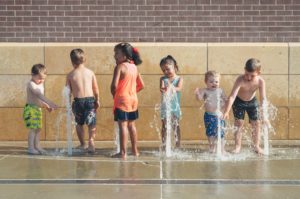Speech and Occupational Therapy for Social Skills
My child has difficulty with social skills – what can we do to help?

Connection is a basic human need, and sometimes when our kids have communication challenges, initiating, forming and developing connection with others can be tricky.
Beginning in infancy, in the toddler – years, whilst at school and throughout our teenage & early adult years – our social skills continue to develop and refine.
We learn to collaborate, to play, to learn from others and to share thoughts and ideas.
Social skills are a vital area of our communication and participation. At Cooee, our speech pathologists and occupational therapists regularly work with children who need support in the area of social skills.
So, how do you know if your child needs support with their social skills, and who should you be seeing to access this support?
First: What are social skills?
Social skills refer to the ability to interact and communicate with others while following social rules. Social skills include our body language (eye contact, facial expression, regulation) as well as our social communication and how we interact with others. They also refer to our ability to read other peoples social cues, while managing our own in response.
In short – it’s a complex interaction of many areas – expressive language, emotions, comprehension, self awareness and regulation.
Speech pathologists work extensively on social communication.
Speech pathologists assess a child’s language skills (how they understand and use language), the type of language they use to communicate in a variety of situations and their ability to participate in conversations (listening, turn-taking, asking questions and staying on topic).
Conversational language requires a wide variety of language skills, including the ability to tell stories, negotiate, persuade, listen and take on board other’s ideas. Once your child’s overall communication skills have been assessed, specific goals can be made to support their ability to communicate socially with others.
An example of a goal may be to participate in a conversation with another person while turn taking and remaining on topic. In order to achieve this goal, our speech pathologists will work on your child’s specific language needs.
Our occupational therapists might then focus on the child’s ability to inhibit impulse actions, e.g. interrupting, or running away mid conversation, regulate their body to remain attentive during the conversation and help the child to plan and organise their thoughts to be able to respond. Both therapists may also work on the child’s ability to recognise when they have gone off topic.
Our occupational therapists focus on a wide range of goals when working on social skills.
In early social skills (with toddlers and pre-preps) we would focus on play skills and the ability to interact with someone in play through turn taking, shared engagement and sequencing of play.
Later down the developmental journey, Cooee’s occupational therapists shift their focus to more cognitive based strategies (executive functions) that include the ability to plan and organise their thoughts, control their emotions and bodies during a conversation, inhibit impulse actions and shift between topics flexibly.
Our occupational therapists and speech pathologists are able to work collaboratively on these goals to help children to communicate and participate in social situations effectively.
If you find your child has difficulty with any of the skills above, please contact our experienced team of child occupational therapists and child speech pathologists to book an assessment and help your child move towards social success.
